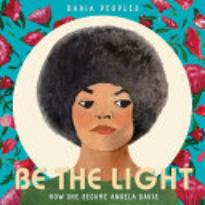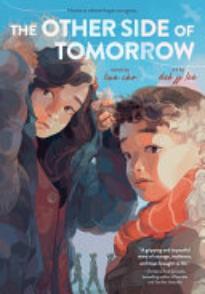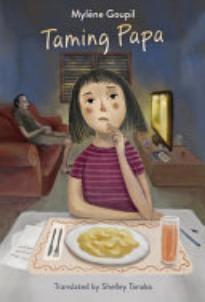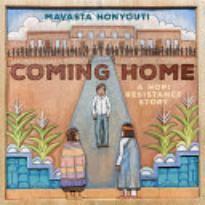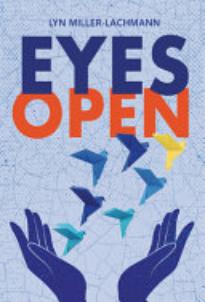Political prisoners
9 Reviews
(2)
K-3
This picture-book biography of the educator and "passionate activist for equality and justice for all" emphasizes how the events of Davis's (b. 1944) early life growing up in 1940s and 1950s Birmingham, Alabama, had a profound impact on her later work fighting segregation and racism. Bombings in her neighborhood by the Ku Klux Klan and "whites only" signs at the library, the amusement park, and the movie theater reminded her of societal restrictions, and she became angry. In a spiritual revelation following the death of her grandmother, she let go of her anger and acquired a special power: "the ability to see new freedoms and new futures." Davis could envision a new world "where segregation, like slavery, was abolished, where God ordained love, and all were welcome." During adulthood, she became a professor, a political activist for prisoners, and a prisoner herself. While incarcerated, she shared her power with the other women; after her acquittal and release, she became an abolitionist and remains one today. Peoples's reverent narrative and evocative digitally rendered gouache-like illustrations vibrantly convey the essence of Davis's unwavering activism and resolute optimism for a new world. Back matter includes an author's note and a timeline.
Reviewer: Pauletta Brown Bracy
| Horn Book Magazine Issue:
July, 2025
(1)
4-6
Illustrated by
Deb JJ Lee.
In this intense and moving comic, we follow two North Korean refugees -- Yunho, a shy, thoughtful boy; and Myunghee, a music-loving girl -- on a harrowing year-long trek through mountains, cities, and jungles. The story opens in 2013 and unfolds in diary-like alternating chapters in lyrical language, starting with daily hardships under the brutal communist regime -- famine, hard labor, the threat of constant spying, and deadly consequences for rule-breakers. Instead of attending school, Yunho scavenges for scrap metal, while orphaned Myunghee sells foraged vegetables. After witnessing a public execution, the strangers-turned-friends flee on foot into China, eventually reuniting with Yunho's mother and following an underground network of guides to help them evade the police and military. Life on the run is dangerous -- the trio is captured and put into prison; their escape through the jungle to Laos is full of peril, and their crossing into Thailand is almost derailed by a corrupt border guard. Despite the bleak circumstances, Cho's characters grow emotionally though exposure to the outside world, kindness from strangers, and awakening religious faith. Lee's detailed, cinematic digital illustrations vividly convey the refugees' journey. Ghostly pale orange and gray scenes with occasional color flashes for positive experiences (like a full meal or a K-pop song) gradually brighten until the trio reaches their new home in California. An endnote includes information on North Korea's history and repressive government.
Reviewer: Michelle Lee
| Horn Book Magazine Issue:
March, 2025
(2)
4-6
Translated by Shelley Tanaka.
Mélie lives alone with her mother, Sofia, until one day they receive a phone call informing them that Sami (Mélie's father) will be released from prison. This is the first Mélie has ever heard about her father (she assumed she didn't have one). While it's never revealed where the family is from, it's clear Sami was a political prisoner; he was imprisoned for not keeping quiet. Mélie's excitement about her father is crushed once she realizes he doesn't speak her language and is a frail, odd man who seems uninterested in her. It also becomes evident that he suffers from post-traumatic stress disorder: he has frequent nightmares and refuses to leave the apartment. "He's come out of prison, but the prison has not come out of him." When Mélie takes in a stray kitten, it has a soothing effect on her father's jangled nerves and acts as a bridge between them. Mélie tries to teach him her language, while using the kitten to "tame" her papa into being a more engaged parent. This compact novel excels in its portrayal of a young girl's complicated feelings toward her father, as best portrayed in a series of moving vignettes that expertly shows, rather than tells, the reader what trauma does to a family system.
Reviewer: Julie Hakim Azzam
| Horn Book Magazine Issue:
May, 2024
 Honyouti, Mavasta
Honyouti, Mavasta
Coming Home / Tutuqaykingaqw Nima: A Hopi Resistance Story / Hopisino Pahan Tutqayiwuy Ep Yorhomti
(2)
4-6
Translated by Marilyn Parra.
Honyouti (Hopi, Iswungwa/Coyote clan) is an award-winning carver. His low-relief carved and painted scenes serve as the desert-colored illustrations for this gently told and moving book about his grandfather's Native American boarding school experience. Most of the illustrations have a slightly three-dimensional effect, both from the actual underlying carved wood and from subtle shading that provides a sense of realism to the highly stylized depictions of landscapes and interiors. Occasional gray and beige illustrations evoke historical photographs. This distinctive style lends itself to the account, which follows a sadly familiar trajectory, outlining the history of forced assimilation of school-aged Native American children stolen from their homes by the U.S. government. Honyouti also references the 1895 imprisonment in Alcatraz of nineteen Hopi men, dubbed "Hostiles," who were arrested in part because they opposed the boarding schools. In addition to the carved scenes, which emulate traditional Hopi art, what sets this book apart is its bilingual text and the appended notes on history and learning, translation, and art. Parra's translation of the text into Hopi Third Mesa dialect is a great example of Native language preservation and revitalization. The author-illustrator provides appended insights into his artistic process and inspiration.
(2)
YA
In this verse novel, Sónia is living to the fullest as much as a fifteen-year-old girl can under the Salazar dictatorship in 1960s Portugal. She writes free-verse poetry, though the nuns at school deride it; loves her protester boyfriend, though he is imprisoned; and works in her family's restaurant, until they lose everything for hiring a "banned musician who sang a banned song." Sónia's world grows bleaker and more volatile as friends abandon her and her parents treat her with hostility, blaming her for their misfortunes. As Sónia seeks respite in other friendships and relationships, she tries to determine how she wants to live: as a protester against injustice, or safely and comfortably. Miller-Lachmann's free-verse poetry captures the exquisite and the harrowing, the potent longing in romantic moments as well as the physicality in brutal ones: beatings from Sónia's father and from police, the blistering burn from a workplace injury. Both the verse format and the intensity of the protagonist's lived experiences and choices make this story about the power of teenage resistance a page-turner. Back matter includes an author's note with historical background, discussion questions, a glossary, and further reading.
(2)
4-6
Illustrated by
Nahid Kazemi.
et during the rise of the Taliban in 1990s Kabul, Afghanistan, this story begins when young Zia's father is taken away by the police. A sequence of violent acts ensues: the homes of his friends across the street are flattened in an explosion; the Taliban establish draconian measures that limit freedom, such as closing schools for girls and forbidding women from working. Compact prose captures a child's experience while conveying a deeper, more haunting truth: "Dark nights without lights, cold rooms without heat, and endless gunshots. Blood on the street didn't shock us anymore." After furtively selling their belongings to raise money, Zia and his mother flee to Pakistan and find refuge when a religious school offers to not only teach Zia for free but also pay his mother a stipend. He eventually realizes that at this Islamic madrassa, students are being trained to carry out suicide missions. Mother and son finally immigrate to Canada, leaving behind a father whose fate is still unknown. Charcoal illustrations start each chapter, further setting the mood, often counterbalancing the beauty of the landscape and the safety of family against an increasingly hostile political environment. This haunting, sparely narrated novella packs a powerful punch. A historical note is appended, adding further context.
Reviewer: Julie Hakim Azzam
| Horn Book Magazine Issue:
September, 2024
(2)
K-3
Illustrated by
Charly Palmer.
Nelson Mandela (1918–2013) is remembered for his "wide, warm smile"--but the hope that fueled that smile was difficult to maintain. As a child and a young man, he worked hard and had hope for his future. When South Africa's apartheid laws were created and enforced, Mandela used his position as a lawyer to defend Black Africans and joined the African National Congress to create a plan for a united and free nation for all. The government sentenced Mandela and other freedom fighters to life in prison, but Mandela didn't let his imprisonment or his anger stop his cause. This detailed picture-book biography, with its comparatively lengthy text, highlights how Mandela used whatever means were at his disposal to continue progressing toward freedom for his people and his country, even under the most restrictive and difficult circumstances. During his decades in prison, for example, he made a difference by connecting with white guards on a human level. By the time the book shows Mandela freed and elected president, the reader is full of admiration for this passionate and talented leader whose dedication earned him the nicknames of Madiba, "honored elder"; and Tata, "beloved Father of a new country." Palmer's dramatic paintings use dynamic brushstrokes to create engaging portraits of the eminently recognizable Mandela and of the world he influenced. Appended with extensive back matter and source notes.
Reviewer: Autumn Allen
| Horn Book Magazine Issue:
July, 2021
(4)
K-3
Illustrated by
Sean Qualls.
Young Zazi and Ziwelene find a photo of their great-grandfather, Nelson Mandela, at their grandmother's house, which inspires them to ask her about him. The book's question-and-answer narrative seems contrived ("Why did Grandad go to jail?"; "What is justice?"), but Grandma Zindzi's answers are nimbly worded. Qualls's acrylic, collage, and colored-pencil art has a stateliness worthy of the book's subject.
Reviewer: Nell Beram
(4)
YA
Champion of Freedom series.
Color and black-and-white archival photographs (often poorly reproduced), maps, and sidebars combine with a comprehensive text to present an accessible chronological biography of each notable activist. First-hand accounts, drawn from a variety of sources, lend an authentic voice, while the discussion of historical events and figures provides the political and historical contexts that motivated such determination and sacrifice. Timeline, websites. Bib., ind. Review covers these Champion on Freedom titles: Dietrich Bonhoeffer, Aung San Suu Kyi, and Nelson Mandela.
Reviewer: Tamara DePasquale
9 reviews
We are currently offering this content for free. Sign up now to activate your personal profile, where you can save articles for future viewing.


